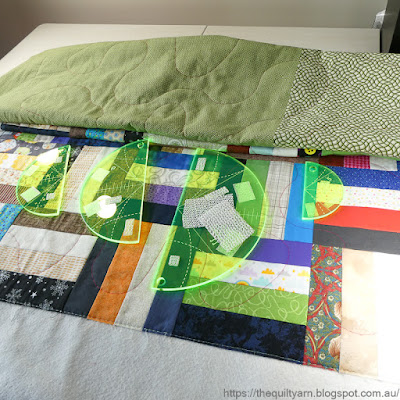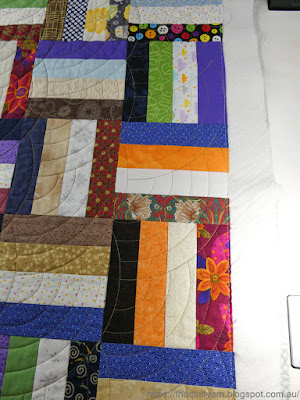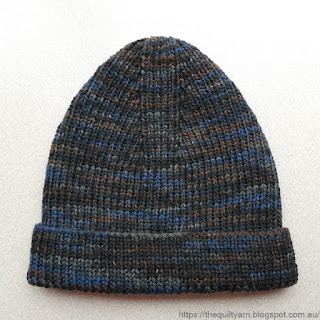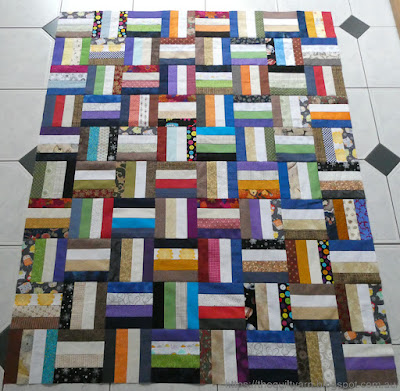Here are the templates (except for the smallest one)
Nice green fluorescent, so cannot be overlooked on your quilt. Nevertheless, I do set myself up with a chair on my right side where I park each template following its use. Having a quilt all scrunched up around you makes it too easy to loose sight of where your rulers are. Except for the biggest one which oftentimes travelled along on the quilt, but I'll get back to that.Beginning the Baptist Fan design at the bottom of the quilt from left to right is an absolute pleasure. Looks great and you always feel like...yah, I got this!
Having done this now a number of times on larger quilts I do know better though and was expecting things to go out of alignment a bit higher up.Interestingly though that did not seem to happen for the first few rows, in fact the templates aligned really beautifully.
See the dotted line of the left fan and the line from the underneath fan...almost perfectly aligned to the stitched fan. Too good to be true...I continued.As I went up I did notice that my line of fans finished slightly differently on the right side. In fact it seemed as if the fans had moved over to the left by about a 1/4in. Did this made sense to me? I thought that I had experienced some drag from the bulk of the quilt as I went along and my alignment went out a couple of times across the quilt. When this happens I do pay a lot of attention to the next row, i.e. are my alignments of the templates at a right angle and are the distances of the individual fans accurate? While the dotted lines then do not align totally with the ones already stitched, I disregard that. To keep it straight and consistent is more important to me as all the next rows are build upon each other. I do not mark the rows on my quilts before I stitch hence rely entirely on the correct placement of the template to keep it straight. So while I am quilting the fans I also look at where each fan finishes in relation to the quilt blocks...that gives me a good idea of whether I am keeping them straight or not.
I think I said it before in an earlier post that stitching these fans on a sitdown machine will never be as accurate as doing it on a longarm machine on a frame simply because you have everything movable, i.e., the bulk of your quilt shifts around, maybe even creating drag and on top of that you have the templates that can easily shift ever so slightly.
I have the Handiquilter sticky (and grippy) tape on the back of my templates (I also had just a rubber type sticky thing on the back initially, however found this too slippery). As you go up in template size, they are big. The 11in fan is as big as my hand, so it is important to stop several times during the stitching of that curve to reposition your hands as repeated shifting will make your entire row shift to the left. A little bit of shifting over is not too bad, however if you are not careful this could go out of hand. My 1/4in shift over was ok and I doubt that it will be noticeable to the recipient of this quilt. Funny enough, once I had discovered the slight shift and paid attention to the drag of the fabric, it did not occur again, i.e. my finishing fan on the right side remained in the exact same position which made me think that I struggled with the drag of the quilt when I started off.
In order to counteract this I folded my quilt in an accordion style manner so that the area to be quilted could move freely. That seemed to fix that issue.
I stitched the Baptist Fan with Omni thread (about 40wt; TEX 30) on my Bernina Q20. Had not stitched with a thicker thread for some time, so this felt a bit like stitching with a rope. (Had no problem with it, the tension sat on 5 using the same thread in the bobbin; needle 100/16) Forgot that there is a fair amount of backtracking involved and at times I struggled to get that to look really neat. However that is where these templates shine. The larger template has got these 1in markings that you can use to travel on your previously stitched line.
So, I used the biggest fan to backtrack over my previously stitched lines keeping it always on the side of the quilt travelling along as I stitched with the other templates. Worked great most of the time except that I was stitching in BSR1 mode for a while which is the one where the needle keeps going even when you stop. That led to some unsightly stitch build up in some areas when I was hesitating. Switched over to BSR2 which is the mode that stops when you stop and that made it easier. Mind you, I was also a bit out of practice and stitching with an unfamiliar thread threw me a bit at first, but I got there in the end.Another stress point in quilting this on a sitdown machine is when you have to turn your quilt over as you approach the middle of your quilt and there is just too much fabric in front of you. Switching it around means you are now quilting from right to left towards you rather than away from you. I always find this a bit harder however have found that it often fixes slight mis-alignments as you now quilting in the other direction. Another point to watch for is fatigue, that feeling of …oh, this will do, I just need to finish this row etc. and disregarding the mis-alignments. If you are tired, stop and do something else and come back to it with a fresh mind honing in on the alignment to get that back on track as you can fudge this here and there to get back to an almost perfect alignment.
So, did I stay straight? That is always a bit nerve wrecking when approaching the end as it will show you how well you executed your design over the quilt. Mine was not too bad at all. All fans finished approximately at the same point (except for one side which was a bit higher). Little indiscretions will not matter here as this will be covered by the binding, so overall I was really happy with it.
Currently debating whether to do this on my next scrap quilt which is bigger than this one. Just really like the look of the Baptist Fan for scrappy quilts in particular.
Karin

































